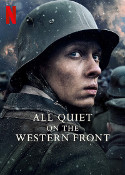
Directed by
Edward Berger
147 minutes
Rated MA
Reviewed by
Bernard Hemingway


All Quiet On The Western Front (2022)
All Quiet on the Western Front is an adaptation of the classic 1929 novel by Erich Maria Remarque (who despite his name was German) an exposé of the horrific experiences of ordinary foot soldiers who died in their millions fighting over a few miles of mud during the First Word War. The tragedy is depicted through the story of five freshmen students who in the initial wave of jingoist fervor sign up for what they believed would be “The Great War”. It was filmed to good effect in 1930 by Lewis Milestone and again in a not-so-good telemovie in 1979.
Remakes of classic films are often risky projects but this, the first German-made version of Remarque’s novel (it is Germany's submission to the Academy Awards this year) hews fairly closely to the Milestone version whilst taking advantage of the vast improvements in film technology since 1930 (an amazing 90 years ago!) and also our higher tolerance for, or expectation of, graphic screen violence.
Directed by Edward Berger from a script co-written with Lesley Paterson and Ian Stokell the narrative is centred on fresh faced recruit Paul Bäumer (Felix Kammerer) and his group of friends from a small German provincial town. Somewhat reminiscent of Sam Mendes' 1917 (2019) the bulk of the film is given over the actual hostilities themselves. Here, the state-of-the-art technical sophistication of the film is somewhat of a double-edged sword. Whilst we are taken right into the heat of battle, dodging machine gun fire and exploding shells or slog our way through the fetid rat-infested trenches we are also aware of the SFX and CGI enhancements that make this possible and thus perhaps don’t see through the surface in a way that Milestone’s much more naïve or less inured audience would have.
It would be interesting know how the decision to make this film came about. Although there is no political or historical explanation for the war (which would require a mini-series) Berger adds to Remarque’s story a sub-plot about German French negotiations in the final days of the war (the chief negotiator is played by Daniel Bruhl, probably the only actor you’ll recognize). Whilst not trying to absolve the German High Command (embodied in a general who orders an attack on the French after the treaty has been signed but not come into effect) it is hardly flattering to their French equivalents who, without the film-makers saying as much, as a consequence produced the breeding ground for National Socialism and Hitler.
FYI: For the English contribution to the massive stupidity see Richard Attenborough’s brilliant satire Oh! What a Lovely War (1969).
Want something different?





